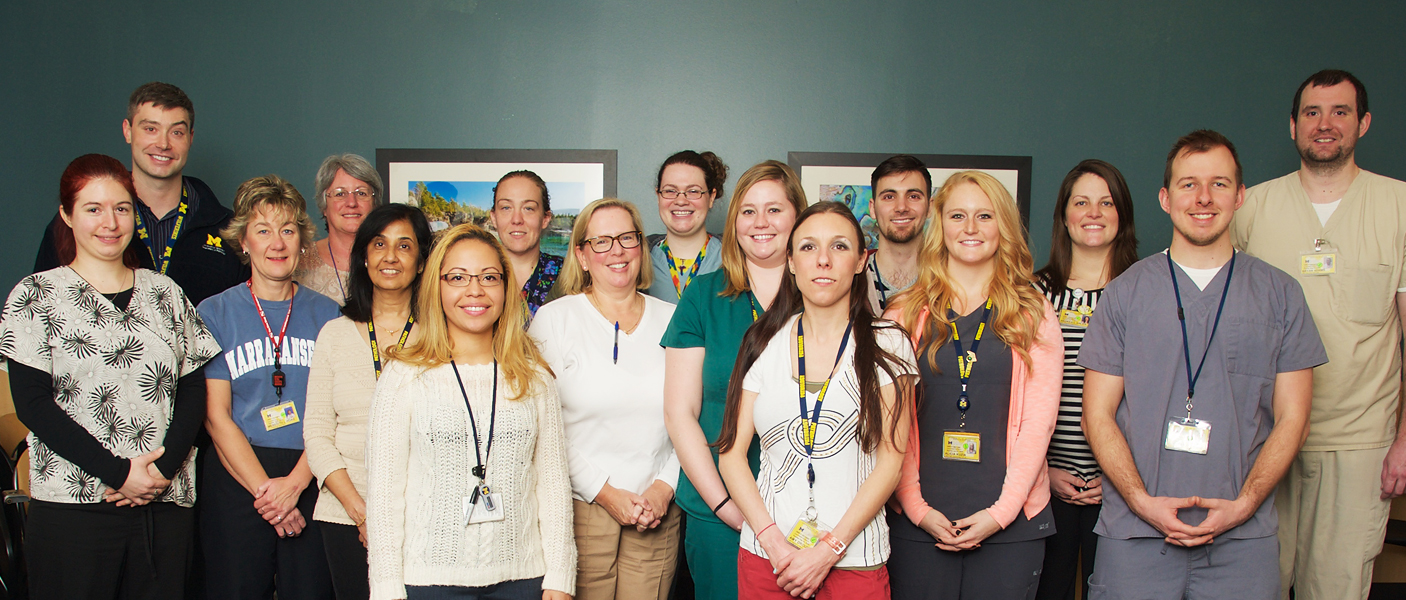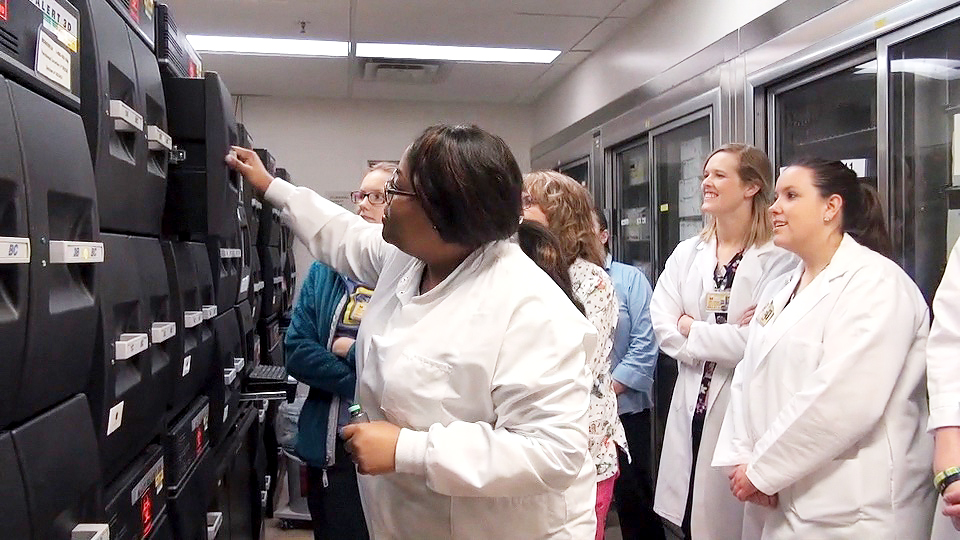

For the past decade, the Lab Ambassador Program has been linking the Pathology laboratories with University Hospital nursing units. "The program streamlines communication,” explains Clinical Pathology Operations Manager Kristina Martin. Better communication ultimately improves patient safety by allowing nurses and laboratory staff to coordinate efforts to enhance and preserve specimen integrity.
As part of the program, medical technologists from the laboratories serve as lab ambassadors, liaisons to the nursing staff in the clinical care units. "It's amazing, because they can see who we are,” says Lab Ambassador Amy Drouillard, a technician in the Microbiology Laboratory. "We're always behind a closed door,” but thanks to the program, nurses have a point person to contact when problems arise. Saira Ramirez, who also works in the Microbiology Laboratory explains: "If a nurse needed help with a certain issue, then they would contact the liaison from that particular lab to try to find a solution.” This allows questions to be answered quickly and efficiently.
Kristina Martin hopes more people will volunteer to serve as ambassadors in the coming months. "Ideally we would have someone from every lab. That's the goal."
One of the first tools that the Lab Ambassadors Program distributed was the Order of Draw card, a quick visual reference for the order in which multiple tubes of blood should be drawn. Ambassadors also arrange educational opportunities with the nursing staff, helping them understand the minimum volumes needed for various tests, the difference between urgent and routine testing, how to properly label and transport specimens.
"It can be empowering and make staff feel like they are part of something bigger. It gives them ownership.”
Saira Ramirez

As part of Medical Laboratory Professionals Week, held each year in April, ambassadors organize lab tours, which are recorded for those who are unable to attend in person. Nursing staff, and all other interested parties, are invited to, "see the different labs, ask questions, just get a better feel for the institution that they work in and the people that are down here,” says Ramirez. Feedback from those who have attended tours has been very positive, with suggestions that every nurse should be required to tour the laboratories.
In addition to improving communication between the nursing units on the patient floors and the laboratories, the Lab Ambassador program increases morale. Says Ramirez, "It can be empowering and make staff feel like they are part of something bigger. It gives them ownership.”
While the program was once thriving, participation has been down in recent years due to staff moving on to new positions or needing to focus their efforts on other responsibilities in the labs. The program is now undergoing a re-launch and in addition to Ramirez and Drouillard in microbiology, the team includes Blood Bank's Kelley Delaney, Cytology's Jenise Fallen, Surgical Pathology's Sally Smith, and Hematology/Coag's Jenn Babinchak, Alicia Kuzia, and Ruth Miller. Jennifer Morey, Merry Muilenberg, and Amy Rosendaul from Chemistry, have also joined the Ambassadors. Laboratory staff interested in joining the Lab Ambassadors Program can contact Saira Ramirez at sgramire@med.umich.edu or Amy Drouillard at amydr@med.umich.edu.
Drouillard appreciates that working as a lab ambassador has given her a voice and allowed her to better connect with her colleagues. "When you're more involved, you're more engaged. Your world opens up to this amazing hospital!"
 ON THE COVER
ON THE COVER
Breast team reviewing a patient's slide. (From left to right) Ghassan Allo, Fellow; Laura Walters, Clinical Lecturer; Celina Kleer, Professor. See Article 2014Department Chair |

newsletter
INSIDE PATHOLOGYAbout Our NewsletterInside Pathology is an newsletter published by the Chairman's Office to bring news and updates from inside the department's research and to become familiar with those leading it. It is our hope that those who read it will enjoy hearing about those new and familiar, and perhaps help in furthering our research. CONTENTS
|
 ON THE COVER
ON THE COVER
Autopsy Technician draws blood while working in the Wayne County morgue. See Article 2016Department Chair |

newsletter
INSIDE PATHOLOGYAbout Our NewsletterInside Pathology is an newsletter published by the Chairman's Office to bring news and updates from inside the department's research and to become familiar with those leading it. It is our hope that those who read it will enjoy hearing about those new and familiar, and perhaps help in furthering our research. CONTENTS
|
 ON THE COVER
ON THE COVER
Dr. Sriram Venneti, MD, PhD and Postdoctoral Fellow, Chan Chung, PhD investigate pediatric brain cancer. See Article 2017Department Chair |

newsletter
INSIDE PATHOLOGYAbout Our NewsletterInside Pathology is an newsletter published by the Chairman's Office to bring news and updates from inside the department's research and to become familiar with those leading it. It is our hope that those who read it will enjoy hearing about those new and familiar, and perhaps help in furthering our research. CONTENTS
|
 ON THE COVER
ON THE COVER
Director of the Neuropathology Fellowship, Dr. Sandra Camelo-Piragua serves on the Patient and Family Advisory Council. 2018Department Chair |

newsletter
INSIDE PATHOLOGYAbout Our NewsletterInside Pathology is an newsletter published by the Chairman's Office to bring news and updates from inside the department's research and to become familiar with those leading it. It is our hope that those who read it will enjoy hearing about those new and familiar, and perhaps help in furthering our research. CONTENTS
|
 ON THE COVER
ON THE COVER
Residents Ashley Bradt (left) and William Perry work at a multi-headed scope in our new facility. 2019Department Chair |

newsletter
INSIDE PATHOLOGYAbout Our NewsletterInside Pathology is an newsletter published by the Chairman's Office to bring news and updates from inside the department's research and to become familiar with those leading it. It is our hope that those who read it will enjoy hearing about those new and familiar, and perhaps help in furthering our research. CONTENTS
|
 ON THE COVER
ON THE COVER
Dr. Kristine Konopka (right) instructing residents while using a multi-headed microscope. 2020Department Chair |

newsletter
INSIDE PATHOLOGYAbout Our NewsletterInside Pathology is an newsletter published by the Chairman's Office to bring news and updates from inside the department's research and to become familiar with those leading it. It is our hope that those who read it will enjoy hearing about those new and familiar, and perhaps help in furthering our research. CONTENTS
|
 ON THE COVER
ON THE COVER
Patient specimens poised for COVID-19 PCR testing. 2021Department Chair |

newsletter
INSIDE PATHOLOGYAbout Our NewsletterInside Pathology is an newsletter published by the Chairman's Office to bring news and updates from inside the department's research and to become familiar with those leading it. It is our hope that those who read it will enjoy hearing about those new and familiar, and perhaps help in furthering our research. CONTENTS
|
 ON THE COVER
ON THE COVER
Dr. Pantanowitz demonstrates using machine learning in analyzing slides. 2022Department Chair |

newsletter
INSIDE PATHOLOGYAbout Our NewsletterInside Pathology is an newsletter published by the Chairman's Office to bring news and updates from inside the department's research and to become familiar with those leading it. It is our hope that those who read it will enjoy hearing about those new and familiar, and perhaps help in furthering our research. CONTENTS
|
 ON THE COVER
ON THE COVER
(Left to Right) Drs. Angela Wu, Laura Lamps, and Maria Westerhoff. 2023Department Chair |

newsletter
INSIDE PATHOLOGYAbout Our NewsletterInside Pathology is an newsletter published by the Chairman's Office to bring news and updates from inside the department's research and to become familiar with those leading it. It is our hope that those who read it will enjoy hearing about those new and familiar, and perhaps help in furthering our research. CONTENTS
|
 ON THE COVER
ON THE COVER
Illustration representing the various machines and processing used within our labs. 2024Department Chair |

newsletter
INSIDE PATHOLOGYAbout Our NewsletterInside Pathology is an newsletter published by the Chairman's Office to bring news and updates from inside the department's research and to become familiar with those leading it. It is our hope that those who read it will enjoy hearing about those new and familiar, and perhaps help in furthering our research. CONTENTS
|
 ON THE COVER
ON THE COVER
Rendering of the D. Dan and Betty Khn Health Care Pavilion. Credit: HOK 2025Department Chair |

newsletter
INSIDE PATHOLOGYAbout Our NewsletterInside Pathology is an newsletter published by the Chairman's Office to bring news and updates from inside the department's research and to become familiar with those leading it. It is our hope that those who read it will enjoy hearing about those new and familiar, and perhaps help in furthering our research. CONTENTS
|

MLabs, established in 1985, functions as a portal to provide pathologists, hospitals. and other reference laboratories access to the faculty, staff and laboratories of the University of Michigan Health System’s Department of Pathology. MLabs is a recognized leader for advanced molecular diagnostic testing, helpful consultants and exceptional customer service.